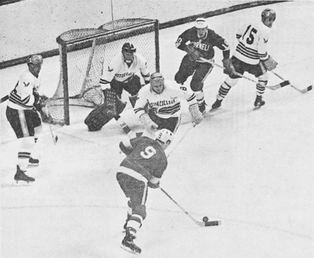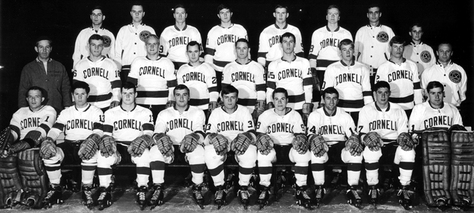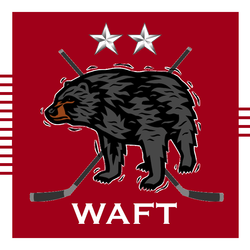Cornell entered the 1967-68 season after the departures of senior contributors such as Doug and Dave Ferguson, Mike Doran, Harry Orr, and Murray Death. Three of whom were on the top line for Cornell during its run to its first ECAC Championship and national championship while placing among the top-five scorers on the 1966-67 squad. Cornell still had ample talent in reserve.
The leading goal scorer from the previous season was Peter Tufford who would embark on his junior campaign with the 1967-68 Big Red. The services of Brian Cornell would return to Cornell's lineup. Brian Cornell was injured during the 1966-67 season and was unable to contribute to the Big Red's success during the second half of the season. Tufford and Cornell would serve as alternate captains during the 1967-68 season.
Early in the season, Harkness praised sophomore John Hughes as a player who resembled Doug Ferguson in his style of play and composure. Sophomore talent abounded as coming up from the freshman roster was also Dan Lodboa. Harkness noted the speed of one other sophomore when he surveyed the chances of the 1967-68 team. That skater was Dick Bertrand who Harkness described as "the fastest skater in the East."
Those who expected growing pains for a relatively young squad that lost a very talented senior core were wildly disappointed by the results of the regular season. Cornell rattled off early season wins against Loyola, RPI, and Guelph. The Brown Bears got their retribution for Cornell's drubbing of them in the 1967 ECAC Tournament when Cornell visited Providence. That was Cornell's lone loss in the regular season. Harkness had forged his fourth Cornell team into a formidable machine that tore through the regular season and was poised for postseason success.
Cornell earned the first seed in the 1968 ECAC Tournament. Cornell would meet an Ivy-League opponent for the second time in the quarterfinals of ECAC Tournament. The Tigers kept the game more respectable than had Cornell's opponents in the first two rounds of the previous season's ECAC Tournament. Princeton tallied the first goal just over halfway through the first period. John Hughes completed a hat trick that was a Brian-Cornell interrupting goal from being a natural hat trick. Cornell dominated the game outshooting Princeton by more than two to one and winning 6-1.
Boston Garden played host to the 1968 ECAC Championship Semifinal. The hometown Terriers would meet Cornell in what would be a postseason rematch of the 1967 ECAC Championship Final and 1967 NCAA Tournament Final. The Garden held less than 14,000 that season. When the Big Red took the ice to confront the scarlet and white, a Boston University-leaning partisan crowd of more than 12,000 greeted them. The intimidation that the Terrier loyalists hoped to impose upon a team that had begun to be dubbed the "Cornell hockey machine" was to no avail.
The 1968 ECAC Championship Semifinal saw the contingent of Lynah Faithful, small in comparison to that of the Boston University fans, drown out the partisan crowd. This occurrence that is now common in almost any venue in college hockey now was a developing phenomenon in neutral site games after the 1966-67 season. The Red skaters did what they could to help the Lynah Faithful's efforts to control the atmosphere at Boston Garden.
Cornell dominated and stifled the Terriers with seeming ease and confidence. Dryden was as good as ever. Most in the stands and on the ice knew that whichever team won this semifinal likely would go on to win the crown of the East. Cornell claimed a 4-1 lead after the first period. Boston University fans were stunned into silence. Pete Tufford sank the puck off of a rebound from Brian Cornell to give Cornell the tally that would stand as the game-winning goal against Cornell's archrival.
Despite the lopsided final score of 7-2, Cornell's defensive efforts in the second and third periods ensured victory. Bill Lewis seemingly singlehandedly killed off a Terriers power play in the second. Cornell's John Hughes chased Boston University's first goaltender. Boston University's heavily vaunted "pinball line, "that was known for its speed in cutting through defenders and connecting for goals, was silenced.
The hometown Eagles were Cornell's next opponent. The Boston Garden filled to only 9,000 people for the 1968 ECAC Championship Final. Boston College fans decided that they liked the Eagles's chances in the NCAA East Regional against St. Bonaventure in men's basketball better than those against the Cornell squad that was unleashed against the Boston University and left the Terriers resting on the porch. The Lynah Faithful returned.
Boston College found the net behind Dryden three-quarters of the way through the first period. Brian Cornell answered less than four minutes later. He would score again in the second frame to give Cornell a one-goal lead. The margin of the game exploded to 6-2 when 1967 NCAA Tournament most valuable player defenseman Stanowski bested Boston College's McPhee with a shot from the point, Bertrand slipped a shot five hole, and defenseman Lodboa converted on a breakaway. The 6-2 margin would stand.
Pete Tufford scored the championship-clinching goal at nearly the 12:00 mark of the second period. Dryden produced a goals-against average of 2.00 and a save percentage of 0.918 over the length of the 1968 ECAC Tournament. Cornell outscored its opponents 19 goals to six goals.
Cornell became the first program in the ECAC to win two tournament championships. The Big Red claimed the absolute lead in the number of ECAC Championships won by any program on March 9, 1968. Cornell has never relinquished its status as the outright leader in number of ECAC Championships won. It has held that august distinction for over 45 years.
Dick Bertrand, Brian Cornell (A), Ted Coviello, Ken Dryden (G), Andrew Crowley, Dwayne Ferguson, Rich Fullan,
Steve Giuliani, Frank Grace, Harold Hegland, John Hughes, Bill Lewis, Dan Lodboa, Gordie Lowe, Bill Mackay,
Bob McGuinn, Ian Orr, Bruce Pattison, Garth Ryan, Walt Stanowski (C), George Swan (G), Pete Tufford (A), Jim Wallace
- Navigate the Rafters -










 RSS Feed
RSS Feed
